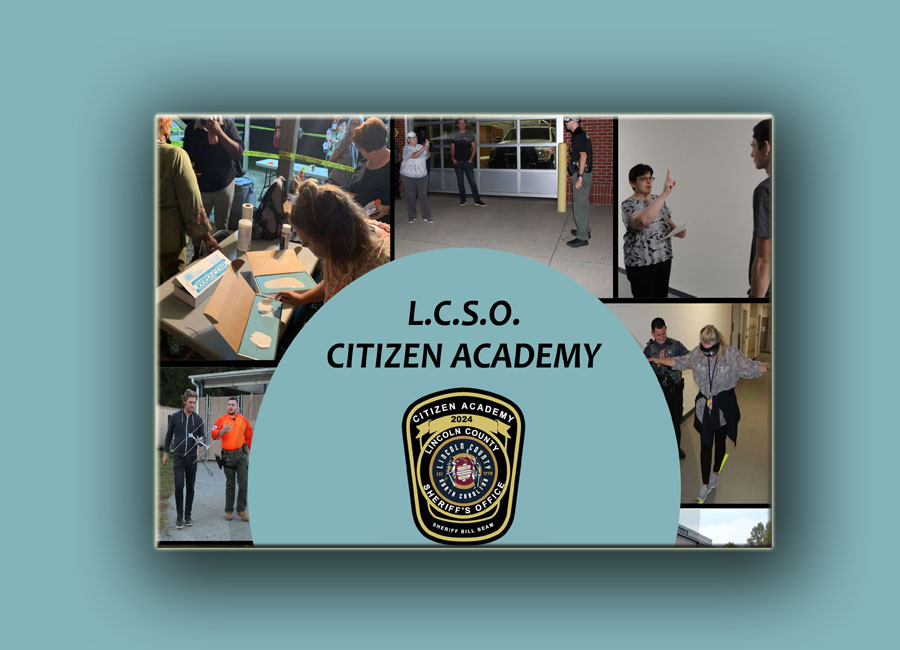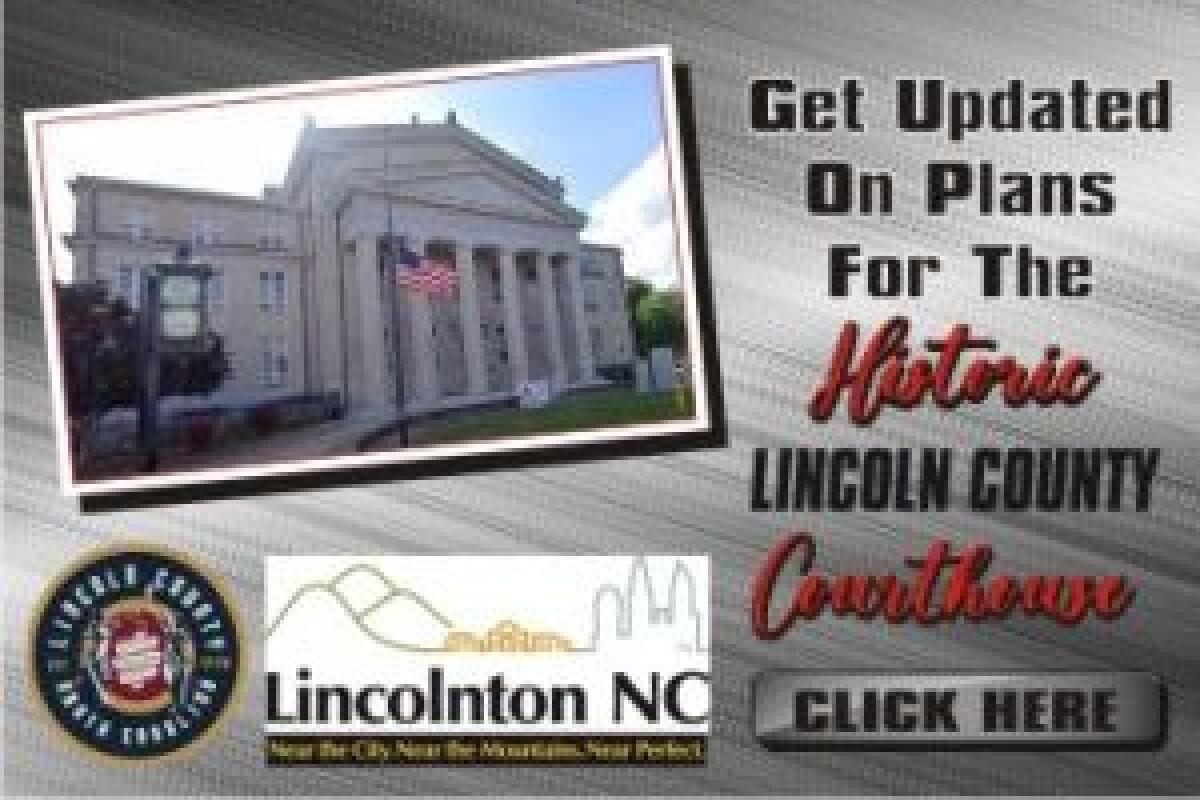- Sunday, 25 January 2026
- Have a HOT TIP? Call 704-276-6587 or E-mail us At LH@LincolnHerald.com
The Ladies Of The Edenton Tea Party And Its Aftermath
Another article from the SAR and DAR leading up to America's 250th birthday in 2026.
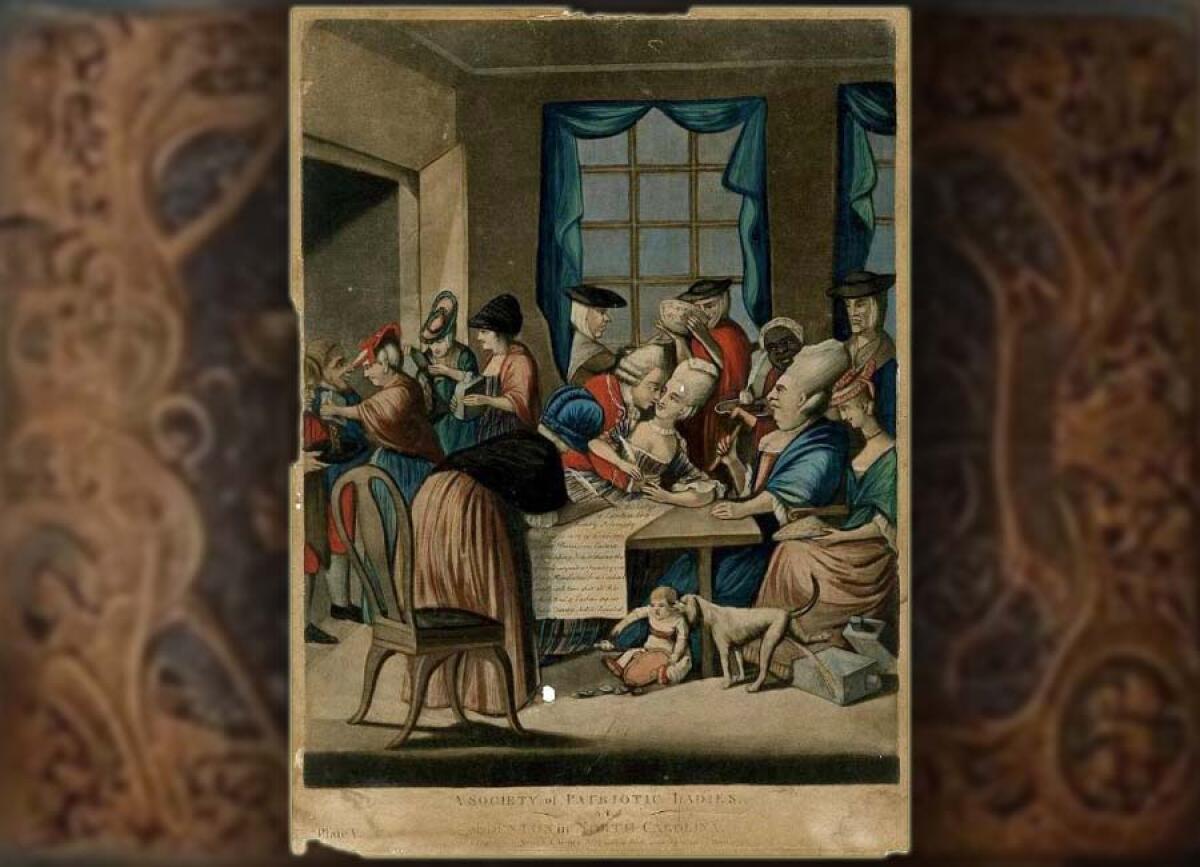
(Public Domain Photos)
In October 1774, 51 ladies from Edenton and the surrounding area signed a statement, dated October 25, 1774, supporting the resolutions passed by the first North Carolina Provincial Congress in the previous August. The Provincial Congress' resolutions were passed to protest the British Tea Act of 1773.
The "Edenton Resolves" affirmed,
Edenton, North Carolina, Oct. 25, 1774. As we cannot be indifferent on any occasion that appears nearly to affect the peace and happiness of our country, and as it has thought necessary, for the public good, to enter into several particular resolves by a meeting of Members deputed from the whole Province, it is a duty which we owe, not only to our near and dear connections who have concurred in them, but to ourselves who are essentially interested in their welfare, to do everything as far as lies in our power to testify our sincere adherence to the same; and we do therefore accordingly subscribe this paper, as a witness of our fixed intention and solemn determination to do so.
This statement was signed by the 51 women: Abigail Charlton, F. Johnstone, Margaret Cathcart, Anne Johnstone, Margaret Pearson, Penelope Dawson, Jean Blair, Grace Clayton, Frances Hall, Mary Jones, Anne Hall, Rebecca Bondfield, Sarah Littlejohn, Penelope Barker, Elizabeth P. Ormond, M. Payne, Elizabeth Johnston, Mary Bonner, Lydia Bonner, Sarah Howe, Lydia Bennet, Marion Wells, Anne Anderson, Sarah Mathews, Anne Haughton, Elizabeth Beasley, Mary Blount, Elizabeth Creacy, Elizabeth Patterson, Jane Wellwood, Mary Woolard, Sarah Beasley, Susannah Vail, Elizabeth Vail, Elizabeth Vail, Mary Creacy, Mary Creacy, Ruth Benbury, Sarah Howcutt, Sarah Hoskins, Mary Littledle, Sarah Valentine, Elizabeth Crickett, Elizabeth Green, Mary Ramsey, Anne Horniblow, Mary Hunter, Tresia Cunningham, Elizabeth Roberts, Elizabeth Roberts, Elizabeth Roberts.
The Edenton Resolves first appeared in the Postscript to the November 3, 1774, edition of the Virginia Gazette and then in the London newspapers throughout the following January. An extract of a letter containing a copy of the Resolves sent to a recipient in Britain was also published in the London newspapers ahead of the October 25, 1774 statement and list of signatures. The letter extract, dated October 27th, states,
(Graphic Inserted: The "Edenton Resolves", list of 51 signatures, and letter extract printed in the "Morning Chronicle and London Advertiser": Jan. 16, 1775 - pg. 2.)
Extract of a letter from North Carolina, Oct. 27.
The Provincial Deputies of North Carolina having resolved not to drink any more tea, nor wear any more British cloth, &c. many ladies of this Province have determined to give a memorable proof of their patriotism and have accordingly entered into the following honourable and spirited association. I send it to you, to shew your fair countrywomen, how zealously and faithfully American ladies follow the laudable example of their husbands, and what opposition your matchless Ministers may expect to receive from a people thus firmly united against them.
As female voices were not always welcome in politics in eighteenth-century British society, the reaction in England was mostly derogatory and dismissive, as seen in the satirical print, "A Society of Patriotic Ladies, at Edenton in North Carolina", published on March 25, 1775, by printers R. Sayer & J. Bennett, and attributed to engraver Phillip Dawe. London resident Arthur Iredell also mocks the 51 Signers' action in a letter to his brother, James (an Edenton resident), when he claims,
The Edenton ladies, conscious, I suppose, of this superiority on their side, by former experience, are willing, I imagine, to crush us into atoms, by their omni-potency; the only security on our side, to prevent the impending ruin, that I can perceive, is the probability that there are but few places in America which possess so much female artillery as Edenton...
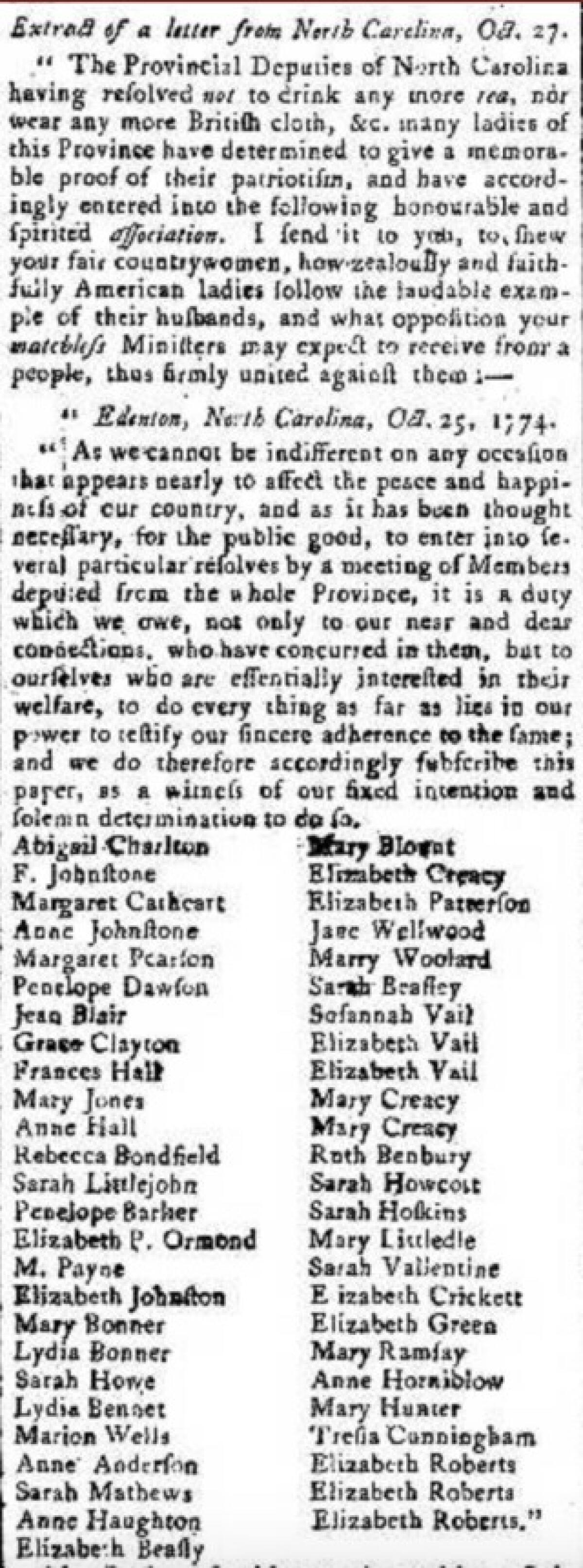
Despite the threat of ridicule from across the Atlantic, women who participated in protests against taxation without representation were often praised as patriots by the Colonial American press. After the "Edenton Resolves" were published, other women followed suit by swearing off tea. Southern women danced in ballgowns made from homespun fabric (that started with the homespun movement). Northern women had spinning bees for the production of homemade material. A shipload of imported East India Company tea was locked away in a port in Charles Town (now Charleston, South Carolina) for months because it could not be sold with the tax. At the start of the Revolution, a group of patriots captured the tea and sold it to other patriots to fund the rebellion against the British. They had also ousted royal officials and agents at the time. The Daughters of Liberty, like the Sons of Liberty, boycotted British goods.
There was little written about the Edenton Tea Party for some time. The first book written about the event was called “The Historic Tea Party of Edenton, 1774: Incident in North Carolina Connected with Taxation” written by Richard Dillard in 1892. In 1907, Mary Dawes Staples wrote an article entitled The Edenton Tea Party, which was published by the Daughters of the American Revolution (DAR). Some of the publications produced in the late nineteenth and early twentieth centuries contain additional details about the Edenton Tea Party that cannot be verified against eighteenth century primary sources.
Maggie Mitchell, in 2015, performs an extensive review of the events of the Edenton Tea Party in "Chapter Three: Uncovering the Events of October 24, 1776" in Treasonous Tea: The Edenton Tea Party of 1774.
In 1908, a plaque was dedicated by the Daughters of the American Revolution of North Carolina and placed in the state Capitol Building in Raleigh, North Carolina. It honored Penelope Barker’s leadership at the Edenton Tea Party. In 1940, a marker was placed at West Queen Street (US 17 Business) in Edenton by the North Carolina Highway Historical Marker Program. It states, "Women in this town led by Penelope Barker in 1774 resolved to boycott British imports. Early and influential activism by women." The women’s names are listed in journals naming the soldiers and patriots of the day including the “Roster of soldiers from North Carolina in the American Revolution”
The identities of the letter's author and recipient are unknown, as is the original author of the "Edenton Resolves". However, all 51 ladies have been identified as patriots by the Daughters of the American Revolution and any of their female descendants are eligible for membership in the society.
On December 8th, the Vesuvius Furnace DAR Chapter will be commemorating this historic event as a part of their annual Christmas Tea at Vesuvius Vineyards. 100% of the proceeds from this event will go to fund historical preservation, education and patriotic projects in eastern Lincoln County. Tickets are available through Eventbrite.

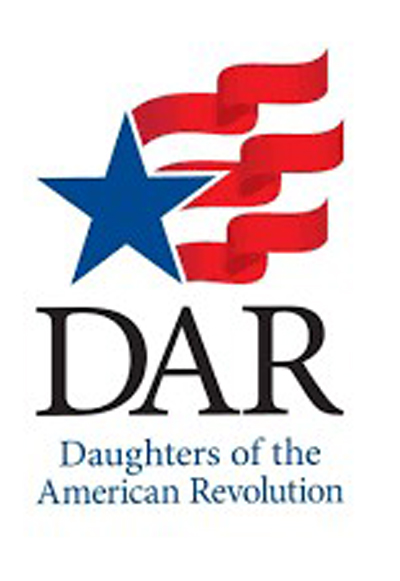 Jennifer Baker, DAR Vesuvius Furnace
Jennifer Baker, DAR Vesuvius Furnace



